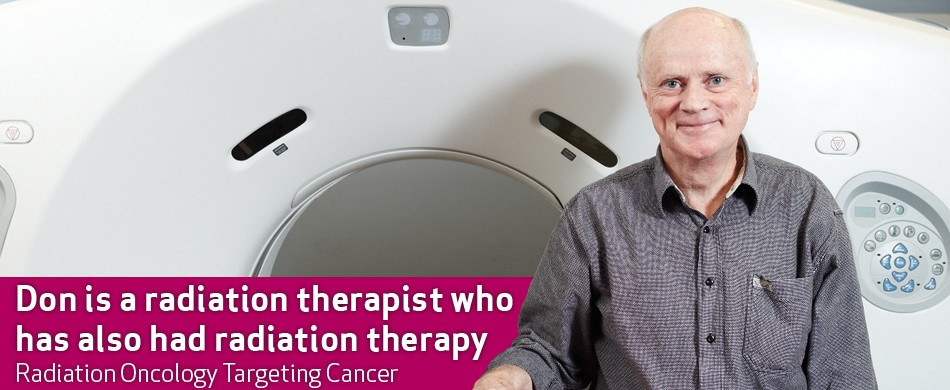FAQs


-
What is radiation therapy used for?
Radiation therapy (also called radiotherapy) is one of the most common treatments for cancer and is used either alone or in combination with other treatments. Depending on the type of cancer and where it is located, radiation therapy may be aimed at curing the disease or be used to relieve or prevent symptoms. Occasionally, radiation therapy is used to treat non-malignant tumours and conditions.
-
How long is a course of treatment?
The length of a course of radiation therapy depends on a variety of factors including the type of cancer, the aims of the treatment and the area being treated. The number of treatments can vary from a single treatment to many weeks of daily treatments (usually 4 or 5 per week).
-
Do I need to stay in the hospital?
The vast majority of courses of radiation therapy are given on an out-patient basis for a short time each day ranging from a few days to a few weeks.
In some circumstances, admission to hospital may be required. If a patient is very unwell or also undergoing other treatments they may be required to stay in hospital. Sometimes if a patient lives a long way from the treatment centre it may be recommended that they stay in the hospital or accommodation close by.
For many patients having brachytherapy which involves the insertion of radioactive ‘seeds’ or sources into a part of the body (e.g. the prostate gland), a night or 2 in hospital is needed for the procedure.
-
Is it a problem if I miss a treatment?
For external beam radiation therapy, courses of treatment work through the delivery of small regular, usually daily, treatments. Generally, no treatments are scheduled for weekends. To ensure the optimal effect, it is important that once started, radiation therapy treatments are not delayed or missed, unless there are exceptional circumstances. Sometimes there are valid medical reasons for the treatment to be missed or deferred and the Radiation Oncologist will discuss these with you.
-
Can radiation therapy be used with other cancer treatments?
Yes, radiation therapy is commonly used in conjunction with other cancer treatments, including surgery and/or chemotherapy or other drug treatments. Depending on the individual circumstances, radiation may be given before or after surgery. Sometimes it is given with chemotherapy or other drugs to enhance its effectiveness. Radiation Oncologists work closely with other cancer specialists to decide the best combination or sequence of treatments to be given.
-
Can I have radiation therapy more than once?
In general, high doses of radiation therapy prevent further treatment from being safely given to the exact same region of the body. However, in the same person, radiation therapy is often used to treat different parts in the body, such as for bone pain occurring at different sites. In certain situations, radiation therapy can be given to the same area with good effect.
-
Should I take medications and/or vitamins while receiving treatment?
Usual prescription medications should be continued as normal through radiation therapy. Many people with a cancer diagnosis take some type of extra non-prescription complementary therapy, vitamins or supplements. It is a good idea to discuss these with your doctor if he/she doesn’t specifically ask because it may be recommended that one or more of these medications are not taken during the course of radiation therapy. An example is anti-oxidants as they may interfere reduce the effectiveness of radiation on the cancer cells.
-
Will radiation therapy be painful?
Radiation therapy is painless and each treatment usually only takes a few minutes. It’s a little like having an X-Ray or a CT scan. A person having treatment may know the machine is in action as it makes a whirring noise and may move around them as they lie on the treatment couch.
-
Is radiation therapy safe?
Radiation therapy is a highly controlled and safe treatment delivered by a specialist team including Radiation Oncologists (doctors), Radiation Oncology Medical Physicists and Radiation Therapists. Robust national and international standards must be applied in the delivery of treatment which is closely monitored and regulated. This, as well as the strict and numerous quality assurance processes at all steps of the planning and treatment phases, ensure that radiation therapy is a very safe treatment option.
To ensure errors are a rare occurrence, equipment is frequently calibrated (adjusted) to confirm correct functioning and both manual and computerised checks are undertaken by several team members before every treatment.
Radiation oncology is a discipline in medicine that is renowned for its ongoing world-class education and training programs. All these measures contribute to the quality and safety of treatment delivery.
If you have any particular concerns in this regard, you should mention these to the radiation oncology team so they can allay your fears.
-
How does the radiation oncologist know how much radiation to give me?
The radiation dose prescribed for an individual is guided by clinical experience and the results of clinical trials. Radiation Oncologists have extensive training in what the suitable dose might be in a given situation, but there is commonly no one ‘correct’ dose.
The decision about dose and number of treatments is partly affected by the type and location of the tumour, the purpose of the treatment and features of the patient, such as his or her general fitness.
-
How does the radiation oncology team know where to direct the treatment and that this is being done accurately?
CT scanning and other imaging, such as MRI, are used at a radiation therapy planning session to work out exactly where to treat and what to avoid. Very small marks (tattoos) are often made on the skin and measurements taken to make sure the treatment beams are aligned to the target region.
At the time of treatment, all of these are double-checked and often CT scans or X-rays are taken during treatment sessions to ensure accuracy. Sometimes special small metal markers are put into an organ to be treated (e.g. the prostate) so that this area can be more easily ‘seen’ by X-rays at the treatment sessions.
-
What are the side effects of radiation therapy?
In the past, radiation therapy was not able to be so precisely targeted, and some patients experienced consequences or side effects long after the treatment. However, due to current technology, modern radiation therapy does not necessarily cause side effects.
The side effects that do occur largely depend on where the radiation is directed, the type of cancer, where it is located, and the purpose of treatment. One common side effect is fatigue not only during treatment, but also just beyond the period of treatment. All other side effects are specific to the area being targeted with the radiation beams, so it is difficult to generalise across all patients.
It is uncommon for radiation therapy to cause severe nausea/vomiting, hair loss or permanent problems that affect patients’ ongoing quality of life.
Potential side effects from treatment are discussed in detail by the Radiation Oncologist (doctor) with the individual patient prior to a decision to have radiation therapy. More information on side effects can be found here.
-
Does radiation therapy harm surrounding organs?
Radiation Therapy is a very individualised treatment. The dose given is targeted as close as possible to the treatment area to keep harming surrounding tissues and organs to a minimum. To be certain all the cancer is being treated, sometimes it is unavoidable that a small portion of unaffected organs will receive some radiation. This may give rise to side effects which are usually temporary but there is always a very small risk of permanent damage.
This is discussed in detail by the Radiation Oncologist (doctor) with the individual patient prior to a decision to have radiation therapy.
-
Does radiation therapy cause infertility?
In certain situations, especially in children or young adults, radiation therapy can affect fertility if the treatment needs to be directed at organs that are part of the reproductive system. In these cases, options for preserving fertility and other options for having a child in the future would be carefully discussed with the relevant doctors. For example, sperm from boys or men in whom fertility may be affected by radiation therapy or other cancer treatments, may be frozen and stored.
-
Will I be radioactive?
Patients having the most common type of radiation therapy, External Beam Radiation Therapy, will not be radioactive at any time. The only time there is any active radiation present at all is when the patient is in the treatment room and the machine is turned on. As soon as the machine is turned off, there is no radiation in the person’s body and they present no danger to anyone around them.
For patients having low dose rate (LDR) Radiation Therapy, if permanent radioactive sources are inserted they do have to observe some simple radiation precautions for a few days or weeks after the procedure. However, this does not pose a risk for their spouse or partner and should not stop them from spending time with their loved ones, including children or pets.
-
Will radiation therapy affect my partner or my family?
The radiation delivered during radiation therapy only affects the person being treated. A cancer diagnosis affects not only the person diagnosed but also people who care about them, so your spouse or partner and family may be affected in terms of helping to support you while you undergo your treatment. It is always helpful for a support person to attend with you to hear the discussion about radiation therapy with the Radiation Oncologist, but they don’t usually need to be present for every treatment.
-
Will radiation therapy cause another cancer?
In general, the risk of this is very small for someone having radiation therapy and depends on the site, the type of cancer being treated, and the age of the patient. Clinical trials over many years have shown that the benefits of radiation therapy for those people for whom it is recommended far outweigh the uncommon possible later cancer risks of that treatment.
-
Is radiation therapy in Australia and New Zealand similar?
The principles guiding the care of cancer patients and the delivery of radiation therapy in Australia and New Zealand are virtually identical. The training programs for the radiation oncology professionals and the quality standards that apply to radiation therapy are common across the two countries.
-
What should I ask my doctor about radiation therapy?
You may like to ask more about any or all of the FAQs listed here. In particular, it is important to know what to ask your doctor about your condition, the results you can expect from the treatment, the length and duration of treatment (and other logistics) as well as the possible side effects. Don’t hesitate to bring up anything else that may affect you and/or your carer(s) during the treatment, however trivial you might think this is. For instance, parking or transport are common issues that can affect the ease of having daily treatments, so these sorts of things may be very important for you to clarify.
-
What if my specific question is not answered here?
Visit Cancer Council or dial 13 11 20 (in Australia)
Visit Cancer Control New Zealand or dial (04) 815-9800 (in New Zealand)
Email us at info@targetingcancer.com.au
Page last updated: 20/10/20



